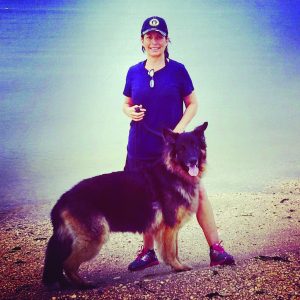Since I was a child, we had dogs and other pets. I always thought my pets and dogs were a part of the family, and realized at a very young age when looking into my dogs eyes, “dogs are people too.” They experience many emotional feelings as well as physical needs.
Let’s examine this further. Animals need to go the doctor for check ups, or if they have a tummy ache, or if they have an ear infection. They can get depressed when they do not see their human. We even bring them to the groomer for a hair cut and a mani-pedi (not exactly but pretty close).
As time went on in my nutrition practice, I realized I wanted to share my nutrition skills with my own German shepherd and some of my friends’ dogs. I wanted to address my dog’s food allergies as well as make sure he got the proper nutrients and a proper balanced diet. As I examined “dog nutrition” further I realized many dogs have health issues and some are overweight. A few even have diabetes. Obesity in dogs is more common than you think; many of the diseases humans get, dogs get as well. Is the American diet also affecting Fido? Can those simple table scraps and poor quality of dog food be causing changes in our pets’ health? Here are some of my Dellonutritional health tips for dogs.
Overfeeding is the number one culprit for an “obese” dog. Pet parents often don’t realize how much their dog is being fed, a perfect recipe for overfeeding. Always set times for feeding your dogs and remember it’s never a bad idea to watch those table scraps.
Get regular physicals from your veterinarian, so that they can check for heart murmurs, lumps and infections.
 Read labels. You are what you eat—yes even dogs. Some dog food can contain chemical, preservatives and other things you would never want to feed your dog.
Read labels. You are what you eat—yes even dogs. Some dog food can contain chemical, preservatives and other things you would never want to feed your dog.
Walking your dog at least twice a day is crucial—dogs need exercise. Do not be afraid to mix it up sometimes. It will also help with anxiety, which will help with behavior problems.
Maintaining good hygiene is important. Giving a dog a bath is not only good to keep them clean, but may also help with their skin. You can even put a few drops of lavender on their coat to help soothe them.
Too often I see people take their dogs for long walks with no water—dogs too can suffer from heat stroke. Always bring an extra water bottle because Fido needs water too. Always go with filtered water or bottled, never tap water.
Always know where your dog is. I see lost dogs on social media all the time. Your dog should always have a license and a name tag. They should also have tracking collars to help find them if they are lost.
Shower your dog with love. Be mindful of spending time with your furry baby. They even like when you talk to them—it boosts their well-being. After all, health is all connected.
Dogs are living longer because of modern medicine and certain methods, but there is more. We can also use holistic approaches, such as acupuncture, chiropractic care, massage, vitamin therapy and even underwater treadmill therapy for rehabilitation. Why not? They love us so much.
Invest in high quality food and know how the food affects the dog, meaning does his stomach get upset if he eats something in particular. You may need to switch it up to get certain nutrients. I have found some dogs can even be allergic to chicken. I like to give my German shepherd lamb and fish with some sweet potatoes and brown rice. I will pick a high quality dry food for the evening meal. Like humans, they actually can get tired of certain foods. Avoid any foods with preservatives and words you can’t pronounce—chances are it’s not good for them.
Know your dog’s behavior and breed. Certain breeds have characteristics according to their ancestors. Like babies, some are born with their own funny personalities. Get to know their physique. Learn what is normal and what is not. Socializing your dog at a young age is key for good behavior.
Give your dog fish oils for a healthy coat and cardiovascular health. Older dogs can benefit from glucosamine and chondrotin to help fight inflammation and other joint issues such as arthritis, and hip dysplasia. Vitamin B12 can provide energy. Probiotics can offer good gut flora and a healthy immune system. Quality counts when it comes to vitamins—know where you’re getting them and read the label. You can also see our website for recommendations.
Dogs should never eat xylitol, chocolate, alcohol, caffeine, onion, garlic, grapes, citrus, raisins and macadamia nuts.
Always check with your veterinarian before you change your pet’s diet or regimen.
Maria Dello is a nutritionist at Dellonutritionals. Her office is located in Manhasset on 75 Plandome Rd.































